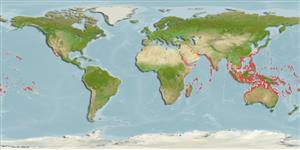Common names from other countries
>
Eupercaria/misc (Various families in series Eupercaria) >
Labridae (Wrasses) > Corinae
Etymology: Cheilio: Greek, chanos, -eos, ous, and chasma, -atos = abyss, mouth opened, inmensity + Latin, muraena = morey eel (Ref. 45335).
More on author: Forsskål.
Environment: milieu / climate zone / depth range / distribution range
Ecologia
marinhas associadas(os) a recifes; intervalo de profundidade 1 - 30 m (Ref. 1602), usually 2 - 30 m (Ref. 27115). Tropical; 24°C - 27°C (Ref. 27115); 32°N - 36°S, 24°E - 109°W
Indo-Pacific: Red Sea and East Africa to the Hawaiian and Easter islands, north to southern Japan, south to Lord Howe Island.
Tamanho / Peso / Idade
Maturity: Lm ? range ? - ? cm
Max length : 50.0 cm SL macho/indeterminado; (Ref. 9823); common length : 35.0 cm TL macho/indeterminado; (Ref. 5450)
Descrição breve
Chaves de identificação | Morfologia | Morfometria
Espinhos dorsais (total) : 9; Raios dorsais moles (total) : 12 - 13; Espinhos anais: 3; Raios anais moles: 11 - 12. Young individuals are usually a mottled brown or green, sometimes with a broad lateral stripe (Ref. 1602). Rare individuals may be uniformly yellow (Ref. 1602). Coloration in this fish is variable: green, brown, orange-brown or yellow, often with narrow, midlateral, broken black stripe which are absent in large males (Ref. 86689). Large males may develop a bright yellow, orange, black, white, or multicolored patch on their sides behind their pectoral fins (Ref. 1602).
Inhabit seagrass beds and algal-covered flats, occasionally in lagoon and seaward reefs to a depth of at least 30 m (Ref. 1602, 41878, 48636). Benthopelagic (Ref. 58302). Usually solitary. Juveniles secretive in seagrasses or attached Sargassum; adults usually in small loose aggregations, but occasionally form large schools to spawn (Ref. 48636). Feed mainly on crustaceans, mollusks, sea urchins (Ref. 37816) and other hard-shelled prey. Oviparous, distinct pairing during breeding (Ref. 205).
Life cycle and mating behavior
Maturities | Reprodução | Spawnings | Egg(s) | Fecundities | Larvas
Oviparous, distinct pairing during breeding (Ref. 205).
Randall, J.E., G.R. Allen and R.C. Steene, 1990. Fishes of the Great Barrier Reef and Coral Sea. University of Hawaii Press, Honolulu, Hawaii. 506 p. (Ref. 2334)
Categoria na Lista Vermelha da IUCN (Ref. 130435)
CITES (Ref. 128078)
Not Evaluated
Ameaça para o homem
Reports of ciguatera poisoning (Ref. 130160)
Utilização humana
Pescarias: pouco comercial; Aquário: Espécies comerciais
Ferramentas
Relatórios especiais
Descarregue XML
Fontes da internet
Estimates based on models
Preferred temperature (Ref.
115969): 24.4 - 29, mean 27.7 (based on 1206 cells).
Phylogenetic diversity index (Ref.
82804): PD
50 = 1.0000 [Uniqueness, from 0.5 = low to 2.0 = high].
Bayesian length-weight: a=0.00417 (0.00256 - 0.00679), b=3.09 (2.95 - 3.23), in cm Total Length, based on LWR estimates for this species & (Sub)family-body (Ref.
93245).
Nível Trófico (Ref.
69278): 3.5 ±0.54 se; based on food items.
Resiliência (Ref.
120179): Baixo, tempo mínimo de duplicação da população 4,5 - 14 anos (Preliminary K or Fecundity.).
Fishing Vulnerability (Ref.
59153): Moderate vulnerability (44 of 100).
